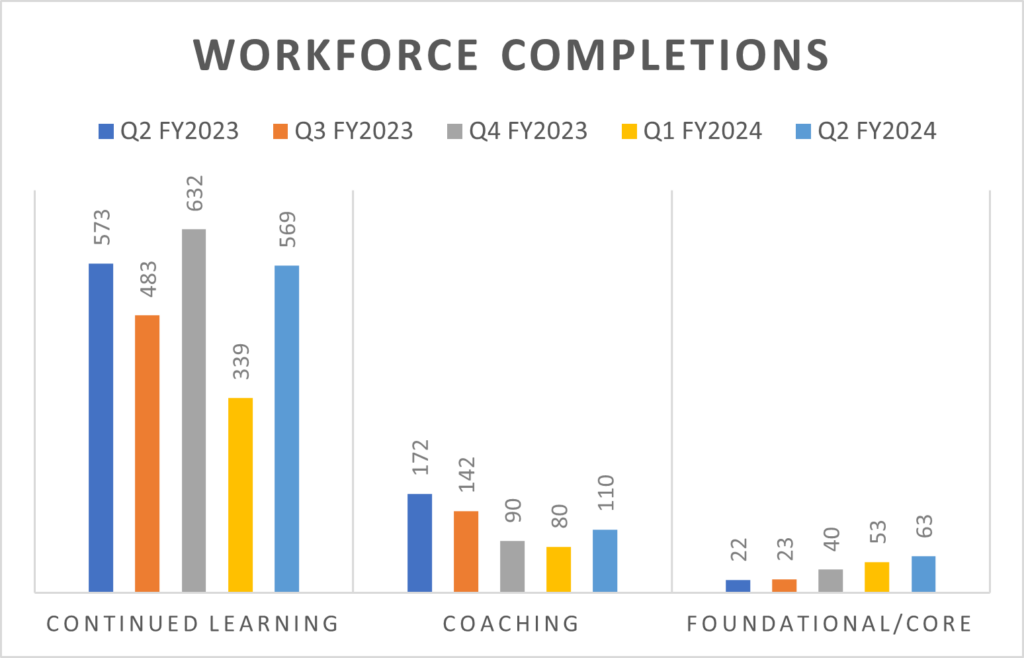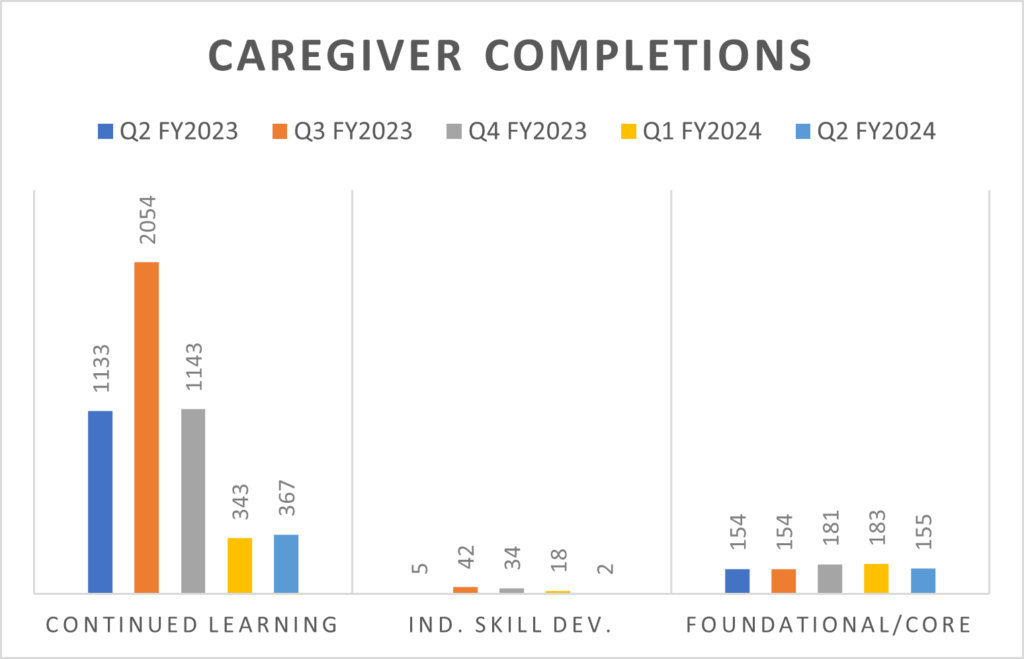Quarterly Report_Q2 FY2024
Program Updates
Administrative Professionals Conference
The Alliance hosted this year’s Administrative Professionals Conference on Nov. 13 and 14 at Cedarbrook Lodge in Seattle. This is the first year the event was held for a full two days. You can view the agenda here.
- General session topics focused on self-care and inspiration, with keynotes on trauma stewardship, work/life balance and resilience.
- Breakout content included support around tech platforms and programs; a look at the hiring process; communication skills; cultural humility and inclusive language; mindfulness; and DEI best practices.
- Participants mostly valued sessions on mindfulness, self-care, and resiliency, and appreciated opportunities to network and build connections.
- Some attendees expressed they wished they could stay at the venue to take advantage of more team-building time but lived too close.
By the Numbers
"Every presentation, breakout, group project was incredible, amazing, hilarious and engaging. I learned so much. I will take so many now ideas and concepts to my home office and try to apply them to myself, my team, and my office.”
— Attendee feedback
New data for Foundations of Practice training
The Foundations of Practice training launched in October 2023. The modules are in-person, one-day trainings that were developed by DCYF program managers to support the implementation of HB 1227 into practice for DCYF field case workers. These modules were adapted by the Alliance to deepen new case worker knowledge following the completion of Regional Core Training.
There are four modules: Removal Standards – Defining Imminent Physical Harm Using our Safety Framework; Harm of Removal; Kinship Caregivers – Identify, Locate, Inform and Evaluate; and Preparing for Shelter Care.
Foundations of Practice was offered in each of the regions with strong involvement of judicial officers and AAGs. Among 56 DCYF staff who responded to the evaluation survey, about half were CPS FAR or CPS Investigations staff, and participation was strong in Regions 1 and 6.
Typical recommendations for improvements for the course included shortening the discovery packet and allowing more opportunity for small-group engagement.
Regarding diversity, equity and inclusion suggestions, responses were widely positive that the course was inclusive. Individual learners suggested: try an ICW case, include more people of color in the roles of attorney and judge, or invite a defense attorney to join the simulation. One learner observed that while the facilitator tried to address DEI, there did not appear to be much within the modules to support this exploration.
Almost half of respondents (40%) noted that the feedback/debriefing was the most useful to their learning. Many of these mentioned how helpful it was to receive feedback from the legal partners (AAG/judicial officer). Over one third (34%) shared that the simulation itself gave them the opportunity to practice in a realistic way for giving shelter care testimony. Almost one fifth (19%) noted improved understanding of and articulation of the new standards. Observing their peers giving testimony was noted by 9% of respondents.
About 38% of respondents wanted more time to prepare for and to debrief the simulation, and 6% of learners wanted more time in the simulation experience. Other suggestions offered by a handful of learners were to provide more individualized feedback, provide more direct instruction about the new standards, hold the simulation in court, provide the video and reading material before the start of the training, hold the first day of training virtually.
By the Numbers
"(I appreciated) providing deeper understanding of the big picture of child welfare and doing it with other employees."
— Attendee feedback
CaRES special event on opioids
In November, CaRES hosted an online information session on opioids, fentanyl and Narcan.
The discussion was led by Amy Wheat, the opioid outreach specialist from Snohomish County government, who discussed:
- Opioid use, including what the medication is used for, persons at high-risk for overdose and a look at opioid addiction;
- Data around the increase in overdoses, and overdose recognition and prevention;
- Fentanyl use and dangers (or lack thereof) around certain types of exposure; and
- How to obtain and administer Narcan.
This session was created at the request of caregivers and was one of CaRES’ most highly attended events this year, with 48 attendees. The video has had 15 views online since being posted Nov. 2.
Course launches
Click each title for a description of courses launched this quarter.
This course helps participants understand the importance of self-care and practical ideas for how to do it. Participants will understand signs of stress and burnout and recognize the importance of maintaining their mental, physical, emotional and spiritual well-being. The course also covers parental resilience, why resilience is important, and how caring for children who have experienced trauma, separation, or loss can impact a caregiver’s own well-being. Participants will also learn about the behaviors that foster a protective environment for parents and children.
This course provides participants with an overview of cultural humility and helps participants recognize the importance of honoring a child’s cultural identity. Content also covers respecting families from varying races, religions, ethnicities, and economic statuses. Openness to a child’s sexual orientation and gender identity and expression and viewing these differences from a strengths-based perspective is highlighted. Course learnings include strategies for parents who are fostering or adopting to respect as well as navigate differences in values from the children and families while acknowledging imbalances of power and inequities.
This discussion will prepare CPS FAR and CPS FVS caseworkers who wish to expand their practice in developing case plans with parents/caregivers, children, Tribal representatives, and other family identified supports. Participants will learn how to make the most of meeting with families in building a working relationship geared toward reducing or eliminating safety threats and increasing the parent or caregiver’s protective capacities to ensure child safety, well-being, and permanency. Participants will be provided with tools to improve the quality of case plans and will be provided an opportunity to staff a case with peers.
These sessions will provide participants of the Advanced Motivational Interviewing training an opportunity to deepen use and practice of Motivational Interviewing, focused on everyday child welfare. You will focus on your role as a facilitator rather than an expert to collaborate, evoke and honor the family’s autonomy. These sessions will provide opportunities to apply strategic responses to move families toward change without coercion and avoid practitioner responses that trigger resistance.
This course helps participants understand the child welfare experience from the perspective of the child’s parents and supports finding compassion for parents and the challenges they may be facing. Strategies to nurture children’s relationships with their parents and to integrate and maintain ongoing communication and connection between parents and children are covered. The course also covers potential challenges in partnering with the child’s parents and looks at how to help children prepare for Family Time, including understanding and managing reactions.
The Foundations of Practice Modules are an in-person, one-day training that was developed by DCYF program managers to support the implementation of HB 1227 into practice for DCYF field case workers. These modules were adapted by the Alliance to deepen new case worker knowledge following the completion of Regional Core Training beginning with the June 16, 2023, RCT Cohort.
There are 4 modules:
• Module 1: Removal Standards – Defining Imminent Physical Harm Using our Safety Framework
• Module 2: Harm of Removal
• Module 3: Kinship Caregivers – Identify, Locate, Inform and Evaluate
• Module 4: Preparing for Shelter Care
This course helps participants understand the short- and long-term impact on children exposed to substances prenatally. This includes FASD and issues that may be present if parents use(d) substances, and medical issues that can arise due to substance exposure, including higher risk of later addiction. The genetic component of addiction and addiction as a chronic disease is described. This course also shares parenting strategies for children exposed to substances prenatally.
This webinar acknowledges the complexities associated with caring for children who are related, including: divided loyalties, redefining roles and relationships, setting boundaries with parents and other relatives, and the range of emotions including anger, resentment, guilt and/or embarrassment that caregivers can feel. Strategies for how to manage family dynamics and conflicts, identify triggers and effectively manage stress are shared.
This course helps participants understand the importance of integrating and maintaining ongoing communication and connection between siblings, including understanding sibling dynamics and the importance of sibling bonds. Tips for how to navigate and support visits with siblings are shared. This course also helps participants recognize the importance of maintaining connections with extended family members and the community at large (i.e., schools, church, friends, sporting teams) and identifies strategies to keep children connected to their community. The role of out-of-home Caregivers in maintaining these connections is highlighted.
This course provides a foundational understanding of mental health disorders and conditions that commonly occur in childhood. Content is shared to illustrate that not all “survival” behaviors or symptoms of grief are connected with mental health disorders. Commonly administered psychotropic medications are described and information about how to obtain consistent, adequate and appropriate access to mental health services is highlighted.
Our Naloxone Storage and Usage eLearning is designed specifically for caregivers in Washington State to equip them with essential knowledge and skills to respond to opioid overdose emergencies effectively. This comprehensive eLearning provides critical information on the storage and administration of naloxone, a life-saving medication for opioid overdoses.
This course helps participants understand the impact of parenting children from different racial/ethnic/cultural backgrounds and to know how to honor and incorporate child’s race/ethnicity/culture into their existing family system. Strategies are identified to help children develop positive and proud identities and to help children and families prepare for and handle racism in all forms.
This course helps participants learn the three Rs (Regulate, Relate, Reason) and other practical trauma-informed parenting strategies. Trauma support resources for children are described. Participants will recognize the importance of finding activities to have fun with children; recognize the importance of connected parenting and the relationship as the foundational cornerstone; understand how to promote healthy behaviors; and recognize the importance of a parent’s self-regulation. Also highlighted are ways to be proactive versus reactive and the difference between discipline and punishment.
Training Summary


* A unique learner is each individual learner who has taken any class this quarter, whereas the total number of learners will count a learner each time for each course they complete. The number of unique learners includes eLearning learners.
